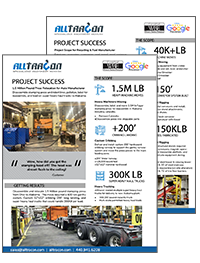How Industries Can Benefit from AI Technology
In the last few decades, Artificial Intelligence (AI) has rapidly transformed from a theoretical concept to a practical tool that has revolutionized numerous industries. From healthcare and finance to manufacturing and entertainment, AI technology is reshaping the way businesses operate and deliver value to their customers. This article explores the manifold ways in which industries can benefit from AI technology, ushering in a new era of efficiency, innovation, and growth.
Enhancing Operational Efficiency
One of the most significant advantages that AI technology brings to industries is the ability to enhance operational efficiency. With AI-powered automation and process optimization, businesses can streamline their operations, reduce errors, and accelerate decision-making. In manufacturing, for instance, AI-driven robotics and automation systems have led to faster production cycles, decreased downtime, and improved quality control. Similarly, in logistics and supply chain management, AI algorithms predict demand patterns, optimize routes, and manage inventory, reducing wastage and costs.
Data-Driven Decision Making
Industries today generate vast amounts of data, and AI offers the tools to transform this data into actionable insights. AI algorithms can analyze complex datasets much faster than human analysts, identifying patterns, trends, and correlations that might otherwise go unnoticed. In finance, AI-powered algorithms analyze market trends to make real-time investment decisions, while in healthcare, AI assists in diagnosing diseases by analyzing medical images and patient records. Data-driven decision-making powered by AI not only improves accuracy but also enables industries to stay ahead of the curve.
Personalization and Customer Experience
AI technology empowers businesses to understand their customers on a deeper level and deliver highly personalized experiences. In the retail industry, AI algorithms analyze customer preferences and behaviors to offer tailored product recommendations. Streaming services use AI to curate playlists and recommend content based on users’ viewing history. This personalization not only enhances customer satisfaction but also drives sales and fosters brand loyalty.
Innovative Product Development
Industries can leverage AI technology to drive innovation in product development. AI assists in predictive modeling, simulations, and iterative design processes, enabling engineers to create better and more advanced products. In the automotive industry, AI plays a crucial role in developing self-driving cars by simulating various driving scenarios and refining algorithms. In the pharmaceutical sector, AI-driven drug discovery accelerates the identification of potential candidates, reducing the time and costs associated with bringing new drugs to market.
Risk Management and Fraud Detection
Financial institutions and insurance companies have long benefited from AI technology’s capabilities in risk management and fraud detection. AI algorithms analyze historical data to predict market fluctuations and assess investment risks. Additionally, AI-based fraud detection systems continuously monitor transactions for suspicious patterns, reducing the likelihood of financial losses due to fraudulent activities.
Improved Healthcare Diagnostics
AI has made significant strides in the field of healthcare, particularly in diagnostics. Machine learning algorithms can analyze medical images like X-rays, MRIs, and CT scans, aiding doctors in early detection and accurate diagnosis of diseases. AI-powered diagnostic tools can identify subtle anomalies that might be missed by human observers, improving patient outcomes and potentially saving lives.
Efficient Customer Support
Industries can enhance their customer support services through AI-powered chatbots and virtual assistants. These AI-driven systems can handle a wide range of customer inquiries, provide instant responses, and even escalate complex issues to human agents when necessary. This not only improves response times but also reduces the burden on human support staff, allowing them to focus on more challenging tasks that require a human touch.
Environmental Sustainability
AI technology has the potential to drive environmental sustainability by optimizing resource usage and reducing waste. In the energy sector, AI algorithms can predict energy consumption patterns and adjust power generation accordingly, leading to efficient energy distribution. Smart grids powered by AI help reduce energy wastage and support the integration of renewable energy sources.
Challenges and Considerations
While the benefits of AI technology for industries are undeniable, there are also challenges that need to be addressed. Ethical concerns surrounding data privacy, algorithm bias, and job displacement need careful consideration. Ensuring the ethical and responsible use of AI technology is crucial to prevent unintended negative consequences.
Summary
AI technology is reshaping industries across the board, offering unprecedented opportunities for efficiency, innovation, and growth. From operational automation to personalized customer experiences, the benefits of AI are transforming the way businesses operate and interact with their customers. As industries continue to harness the power of AI, it is essential to strike a balance between reaping its rewards and addressing the ethical and societal implications it presents. The future promises exciting possibilities as AI continues to evolve, driving industries towards greater heights of success but without losing sight of the duty to excellent customer service and full-service solutions that deliver customers from worry and headaches.

